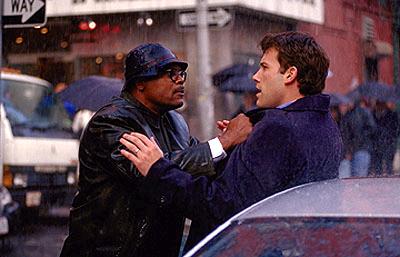

Although it starts promisingly, Changing Lanes eventually bogs itself down in a string of decisions that slowly become more implausible. The premise is basically a test of wills between two men, Gavin Banek (Ben Affleck, Jay and Silent Bob Strike Back, Pearl Harbor) and Doyle Gibson (Samuel L. Jackson, The Caveman's Valentine, Unbreakable). The two come from worlds. Banek works for a high-powered law firm and lives comfortably in the upper echelons of society. Gibson is divorced, and struggling to keep joint custody of his children. The two meet in an accident on the freeway. Both are rushing to court appearances, but Banek is the only one with a working car. Instead of giving Gibson a ride or exchanging information, he merely hands him a blank check.
This causes Gibson to be late for his custody hearing, and the court grants custody to his wife, who plans to move to Oregon. Meanwhile, Gibson picked up a file that Banek dropped. This file contains an original signature that Banek needs in his case. The two happen to meet again, and when Banek realizes Gibson has the file, he wants to do anything he can to get it back. Gibson is, well, pissed. He wants his time back and refuses to give the file back to Banek. Banek needs this file, or his company could potentially lose millions in a fraud lawsuit. The thought of this prompts Banek to contact a man (Dylan Baker, The Tailor of Panama, Along Came a Spider) who has the ability to hack into Gibson's financial records. Thus begins a back-and-forth game of upping the stakes between Gibson and Banek. Each time one does something, the other retaliates with something harsher.
The main problem is that Gibson is easily the person that the audience wants to win. He is fighting for his family, and is seemingly a good guy. In order to muddy the moral waters, screenwriters Chap Taylor and Michael Tolkin (Deep Impact, The New Age) place the Affleck character in his own moral dilemma. He is a not a cutthroat lawyer, he has some morals. It is his firm, led by his father-in-law (Sydney Pollack, The Majestic, Random Hearts) who is pushing him towards fraud. Banek needs to decide what is right and wrong, and struggles with every decision he makes regarding his actions toward Gibson. All this never really works, Gibson is still the more sympathetic character. Part of this is because Jackson is a much better actor, especially here, than Affleck. Also surprisingly effective are a serious Amanda Peet (High Crimes, Saving Silverman) and Kim Staunton (Dragonfly, Holy Man) as the wives of Banek and Gibson.
The other main issue is the way that these two men think. In order for their little battle to escalate as far as it does, it requires them to each make a series of decisions against the other person. In real life, reasonable people would most likely not make these decisions. There are many points in the story where Gibson or Banek could scale things back, or even end their conflict amenably if they did something else. However, doing so would ruin the movie. To fix this problem, director Roger Mitchell (Notting Hill, Titanic Town) keeps things moving quickly. This way, it's harder to realize how kooky the movie sometimes is. Mitchell is able to provide a decent level of suspense, until the last act, where things go a little too far to believe, even within the bounds of this movie.